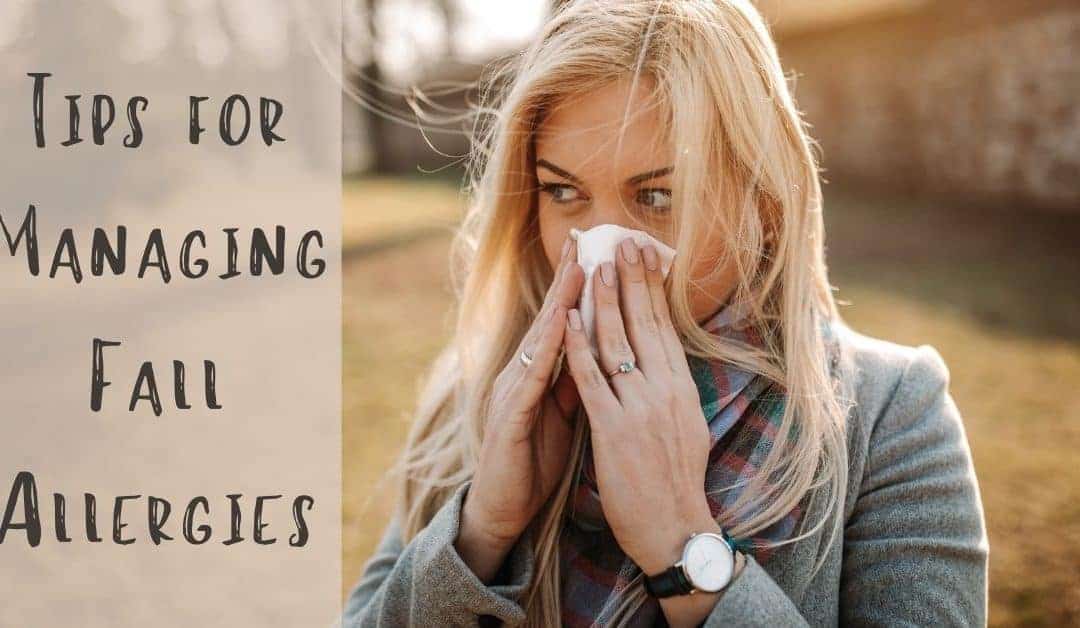Most people think seasonal allergies are only a problem in the spring. Did you know that seasonal allergies can also affect you in the fall? All the common allergy symptoms, such as a runny nose and watery eyes, can hit you in the fall as well as in the spring. As we head into the fall allergy season, here are some tips for managing fall allergies.
The Symptoms of Fall Allergies
Just like the symptoms of spring allergies, fall allergies can be different for everyone. The symptoms will also change depending on what part of your body has been exposed to the allergen. Some of the symptoms of fall allergies include:
- A runny nose
- Sneezing
- Watery or itchy eyes
- Difficulty breathing and increased asthma
- An itchy throat
- An upset stomach
- Hives
- Dry skin or eczema
For most people, the symptoms of their fall allergies will be fairly consistent with the symptoms of their spring allergies.
What Causes Fall Allergies?
As the temperatures drop and the weather changes, weeds and certain other plants start releasing pollen into the air. Not only that, but all the fallen leaves are a great place for mold spores to grow. Some of the most common causes of fall allergies include:
- Airborne pollen, such as ragweed pollen
- Mold
- Mildew
- Dust mites
- Pet dander
Fall allergies can also be triggered as falling temperatures lead you to spend more time indoors. You may be exposed to more indoor allergens like indoor mold or mites.
Tips for Managing Fall Allergies
Have you been struggling with fall allergies? Try these tips to manage your allergies and enjoy the changing seasons.
Stay indoors in the morning: If you’re allergic to pollen, you may want to stay inside in the morning. Check the pollen levels in your area, and if the pollen level is very high on a certain day, try to stay indoors as much as possible. If you need to go out, it’s best to go outside in the evening when the pollen count is lowest.
Cover your skin: When you go outside during fall allergy season, cover your skin to avoid coming into contact with allergens. We recommend wearing long sleeves, pants, and a hat. This will keep pollen out of your face and away from your skin. If you’re doing your fall yard work that could stir up pollen or mold, you can wear a face mask to avoid breathing in the allergens.
Wash your hands: After you’ve been outside, the first thing you should do is wash your hands. If you’ve been outside for several hours, it’s a good idea to take a shower and wash your hair. Washing your hands will get rid of the pollen that’s on your skin. You should also change your shoes before going into the house to keep pollen out of your home.
Hang your clothes inside: Do you hang your clothes outside in the summertime? During fall allergy season we recommend hanging your clothes inside. This will prevent pollen or other allergens from collecting on your clean clothes.
Get a dehumidifier. Another tip that can help you manage your fall allergies is to get a dehumidifier. These machines help remove dust and mold from your home and help you breathe easier. Mold and dust mites need a damp environment to thrive, so running a dehumidifier can keep these allergens out of your home. Place the dehumidifier in your bedroom since you spend many hours every day in your room. If you have an air conditioner, you may be able to use the air conditioner to dehumidify your home. Get a good filter for the air conditioner, and let it clean your air.
Take your medication: Has your doctor prescribed allergy medication? Even over-the-counter allergy medication can help relieve the symptoms of fall allergies. Make sure you take your medication every day during fall allergy season. This will help you manage the symptoms of allergies and enjoy the fall without a runny nose or itchy eyes.
Visit an ENT Specialist
If you’re struggling with allergies this fall allergy season, visit us at Enticare to learn more about fall allergies. We’ll help you discover your allergies and find the best way to manage your allergies. We want you to feel good and stay healthy during fall allergy season.

